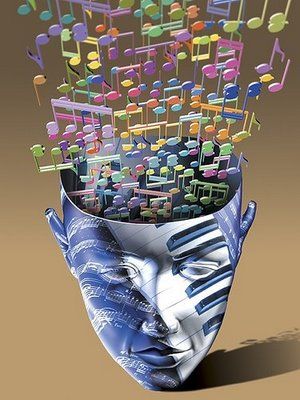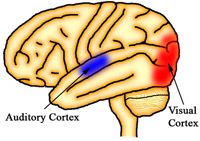
Music. We all know what it sounds like when we hear it. It has the ability to create powerful emotions, or bring back memories from the distant past in our lives. We may use it when we exercise, study for exams, read, or for traveling form point A to point B. But what is music? Is it unique to human beings? How do we interpret music when we hear it? Are the emotions created by music universal, irrespective of the listener’s culture and country of origin? Can music teach us anything about how the human brain functions? These interesting questions and more are explored in the fascinating documentary The Music Instinct: Science and Song, a PBS production that was recently honored with the top prize at the prestigious annual Pariscience International Science Film Festival. ScriptPhD.com’s newest regular contributor NeuroScribe provides his review and discussion under the “continue reading” jump.
REVIEW: The Music Instinct: Science and Song
ScriptPhD.com Grade: A+
In his stirring and enormously popular 2007 opus Musicophilia: Tales of Music and the Brain, neurology professor Oliver Sacks examines the extreme effects of music on the human brain and how lives can be utterly transformed by the simplest of harmonies. These very themes are the foundation of The Music Instinct, hosted by Dr. Daniel Levitin, a neuroscientist and author of This Is Your Brain on Music: The Science of a Human Obsession, and 10-time Grammy award winning musician and vocalist Bobby McFerrin. Together they bridge the gap between listening to and creating music with neuroscientists seeking a greater understanding of how the brain works.

Dr. Levitin states in the program, “The brain is teaching us about music and music is teaching us about the brain.” Well, how does this happen? Music is after all information which the brain processes. How the brain processes and stores information is a huge area of basic neuroscience study. These studies are typically funded by the National Institutes of Health in Washington, DC. The results of these studies lead to improved treatment of patients suffering from a variety of human diseases. The incredible impact music has on people is remarkable. For example, the program mentions how music is used in hospitals to steady the breathing of premature babies, and the heart rate of cardiac patients. A three-year study from 2002-2005 on music therapy for infants was named by The Council for the Humanities, Arts and Social Sciences as one of 12 exemplar studies for the year 2006. For more videos and information on the power of music therapy, please visit the official American Music Therapy Association website.
Is music built into who we are as people? Some scientists do not think so, yet many others believe it is. What is music and how do we hear it? A basic definition would be that music is the vibration of molecules in the air which have a certain pitch and rhythm. These vibrations enter the ear and cause your ear drum to vibrate. As your ear drum vibrates, this causes the movement of three small bones called ossicles. These bones transmit the vibration to the nerves in the inner ear. It is here where the vibrations (initially music) are transmitted into nerve signals sent directly to your brain to be processed. In a nutshell, that is how we hear. While this is well known information, what isn’t well known is how and why music generates emotional changes in the brain after it has been physically interpreted. Scientific research is attempting to answer these and many other questions.
Scientists know a developing fetus begins hearing at seventeen to nineteen weeks of development. Can the fetus hear music? Does the fetus respond to music? The program shows a pregnant mother listening to music while the fetus’s heart rate is monitored. Researchers found that when music was played, the fetus’s heart rate increased. The heart rate of a person is one indicator of what is known as the “startle response”. The startle response is that “fight or flight” instinctual reflex the brain carries out to ensure an animal’s survival. This response is generated from very primitive areas of the brain. They also implanted a miniature hydrophone inside the mother’s womb to see if there was any natural sound in the womb. In addition, the hydrophone recorded what the music would sound like to the fetus. An audio recording from inside the mother transmits the pulsing of blood from the uterine artery. One can also hear the music as well fairly clearly as the infant would hear it—like a muffled sound as if you were underwater in the ocean or a pool. Many scientists think we are “wired” and listening to rhythm, the essential difference between sound and music, even before we are born.
The program also goes beyond just examining the cellular and physiological responses to music to discuss the differences and universal similarities of people’s emotional responses to music. In an interesting study looking at the emotions generated by music, participants listened to different types of classical music while various biological indicators of emotion changes were recorded. The neuroscientists observed when people listened to lighthearted sounds, the body was at a resting state. However, when they heard deep sounds say from a piano, heart rates increased and people began to sweat, indicators of stress. A very interesting recent study asked the question: Are there things about music which go beyond culture. Read about it here. A group of scientists, led by Dr. Thomas Fritz, traveled to the country of Cameroon in Africa. They visited a very remote group of people, the Malfa, living in the mountains. These people have never been exposed to Western music. In fact, in their language they don’t even have a word for music, yet they make musical instruments and play them daily. They were asked to listen to different pieces of Western classical music, and then point to one of 3 faces in a book. Each face represented a different emotion: happy, sad, or scary. The participants knew which emotion went to which face for the experiment. The scientists found despite these people never having heard Western music, they were able to identify music as happy, sad or scary, just as Western people could. Their conclusion was the emotional content of music is inherent in music itself, and is not solely the result of cultural imprinting. This study tells us there are some things about music and emotion which may indeed be universal, and not bounded by country or culture.

Nevertheless, our responses to music are not always universal. In Western cultures, a certain type of pitch is typically identified as being “sad”, yet the same pitch in a different culture is identified as being “happy”. This tells us there are some outside factors, such as culture, which help shape a person’s emotional response to music. Indeed, some of this behavior is in fact learned. Did you ever notice when you hear some music, without even thinking, you start moving your head, or tapping your feet? Why do we do that? Well, the answers aren’t entirely known. However, it is no longer believed the brain has a central “music region”. The listening and processing of music occurs throughout many regions of the brain. In fact, music occupies more regions of the brain than language does! Despite this, the auditory cortex of the brain (pictured at right) has been shown to have strong ties to the motor regions of the brain. People with neurological disorders (strokes, Parkinson’s disease, etc.) have often been found to have improved neurological function after receiving music therapy.
One final interesting scientific argument discussed in this program is the origin of music, specifically what evolved first: music or language? Many scientists believe it is language which developed first, but The Music Instinct provides compelling evidence that suggests perhaps it is music which evolved first. A 2001 Scientific American article suggests that music not only predates language, but may be more ancient than the human race. For those who have watched the news, or traveled to foreign countries, you can see time after time how all types of music, in a different language than the listeners’ native language, influences the emotional behavior of those that are listening.
Music is indeed a universal form of communication which may supersede language. If so, maybe the next time I encounter a foreigner, instead of trying to say “Hello” I will jam out some Beatles tunes!
Trailer:
The Music Instinct: Science and Song was released on DVD November 4.
NeuroScribe obtained a B.S. in Biology, and a Ph.D. in Cell Biology with a strong emphasis in Neuroscience. When he’s not busy freelancing for ScriptPhD.com he is out in the field perfecting his photography, reading science policy, and throwing some Frisbee.
~*NeuroScribe*~
*****************
ScriptPhD.com covers science and technology in entertainment, media and pop culture. Follow us on Twitter and our Facebook fan page. Subscribe to free email notifications of new posts on our home page.